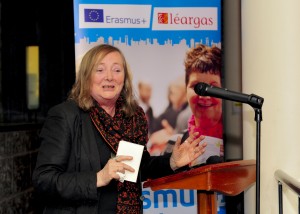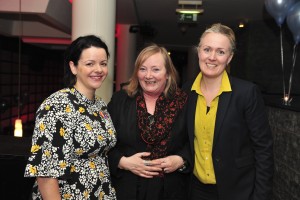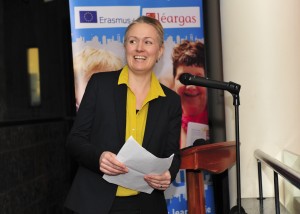EPALE and European cooperation
EPALE, the Electronic Platform for Adult Learning in Europe, is the online community for those with a professional role in adult learning in Europe. Adult educators, trainers, researchers, academics and policy-makers can register as members and engage with adult learning colleagues from across Europe. Through the site’s forum and content, practitioners can forge partnerships and collaborations for future European projects and share good practice and methodologies in the adult education field. “Community is at the heart of EPALE” and last week the National Support Services who manage the platform met in Ireland to foster this community spirit. The meeting was hosted by Léargas as the national support service in Ireland. Organisers Emma Grainger and Aimee Charman were delighted to invite Maynooth University’s Dr Bríd Connolly and Denise Shannon of Léargas as guest speakers during the meeting.
In this post we present some of their insights on the evolution of Adult Education in Ireland and the importance of European cooperation for Adult Education.
The Evolution of Adult Education in Ireland
"The key thing is that adult education has to be about relationships, it has to be about connecting with people, it has to be about helping people to really have a sense of themselves as human beings"
In a week when we celebrate International Women’s Day, it is important to remember the unique role of the Women's Movement in Adult Education in Ireland. Dr Bríd Connolly brought us on a journey of reflection from 1986 to the present and charted the evolution of the sector in her address to the EPALE meeting.
She explained how the Ireland of thirty years ago was “definitely another country” which at that time was recovering from myriad catastrophic social conditions. "In the previous years there were referenda that really attacked women’s rights. One of the things that had happened in the 1970s was the second wave of the women’s movement but by the time the 1980s came there was a real regression and desire to roll back these changes; these regressions were incredibly profound and hurtful in the middle of the 80s”.
It was within this challenging context that "little glimmers of hope occurred in pockets". “Adult education really was part of a revitalisation of the human spirit in so many ways. [...] By the time the mid-80s came, we saw a form of adult education [develop] that really has characterised adult education for the last 30 years. And all of that took place in the most informal spaces: kitchens, community halls and very comfortable little spaces..."
 Bríd Connolly
Bríd Connolly
From their work with women’s groups, the Department of Adult and Community Education in Maynooth subsequently developed the same process for working with people who were unemployed, people who had literacy difficulties and people who would work with people in all of these arenas. From these experiences "golden seeds were planted in the minds and hearts of people about what Adult Education should be".
Bríd went on to discuss how this way of working has been in a continual struggle with another agenda which expects adult education to serve purely economic objectives. In response to the Green Paper on Adult Education that emerged in 1997, she discussed how an "almost counter-revolutionary paper" emerged in 2000 "capturing the idea of working with adults for labour activation". The struggle between the two ceased with the economic crisis of 2008 and in that year she believes the recession was used to drain resources from "anything to do with liberal adult education or with community development or grassroots movements".
Bríd believes that since 2008 there has been a lot of work done to reclaim the purpose of adult education: “Our jobs really are to help people to feel that they are wonderful members of society rather than simply workers. That is very much a part of the story of adult education; it really is about the development of the human spirit and our citizenship and it must help us to fight the kind of takeover of adult education for purposes that do not enhance the human spirit."
“Let this be the future; to really enhance the human spirit” she urged.

European Co-operation in Adult Education
"European cooperation is a living thing, it’s about people, it is moving, changing, adapting, responding and can be found in a multitude of spaces"
Denise Shannon told attendees at the EPALE meeting that the real value of European cooperation for participants in European programmes is "the building of relationships with colleagues across Europe through creating networks of practice, innovating together around challenges and developing new approaches" as well as "the richness that this process of European cooperation brings to our work".
In a national context where there is a lack of programmes to support the sharing of practice across providers, "EU cooperation allows you to reflect on your work and makes you realise the value of what you are doing".
For many involved in Erasmus+ Adult Education and its predecessor Grundtvig (LLP Programme 2007-2013), engaging in European projects "provides a mirror to their work". Denise explained that many participants have said to her that they "did not realise that what they were doing was ground breaking or so ahead of the game. They did not realise they had something so valuable to share". Equally, the opportunity to see something in action through visiting a partner in Europe gives participants the courage to take the leap and try it in their own contexts, as well as providing evidence that new innovations can work. Denise explained that those who participate in the programmes talk about gaining a great professional boost. Participation brings confidence and "brings [participants] into a creative space; it gives them energy to do more; it brings quality to their work".
In a time when economic challenges have meant that the Adult Education field in Ireland has experienced a shift in focus towards those who have recently become unemployed, the European programmes complement this work while also retaining a focus on Adult Education cohorts who have been traditionally hard to reach. Social inclusion is still a key priority under Erasmus+ Adult Education.
“When I went to promote the new Erasmus+ programme, people I spoke to were surprised to hear that the EU programmes still prioritised and placed value on projects that were working to reach these adults. There was still talk of outreach approaches, tailored learning, guidance–there was still talk of Adult Education! And this was very important for them,” Denise explained. And so despite dwindling resources, organisations and practitioners who work with a social inclusion agenda can continue to look to European cooperation to address the complex challenges faced by adults most removed from returning to education: “EU cooperation is more relevant than ever to the work of Adult Education".
At this stage in our journey, 2016, we still see in Erasmus+ an explicit emphasis and priority on 'inclusive educational approaches’ for all fields of education to respond to a fractured society. We find ourselves once again coming back to this priority–not because there are extra resources to do so but because the functioning of our society demands it.
Sincerest thanks to Bríd Connolly and Denise Shannon for their valued insights.
We welcome ideas for and contributions to 'Insights' at comms@leargas.ie

